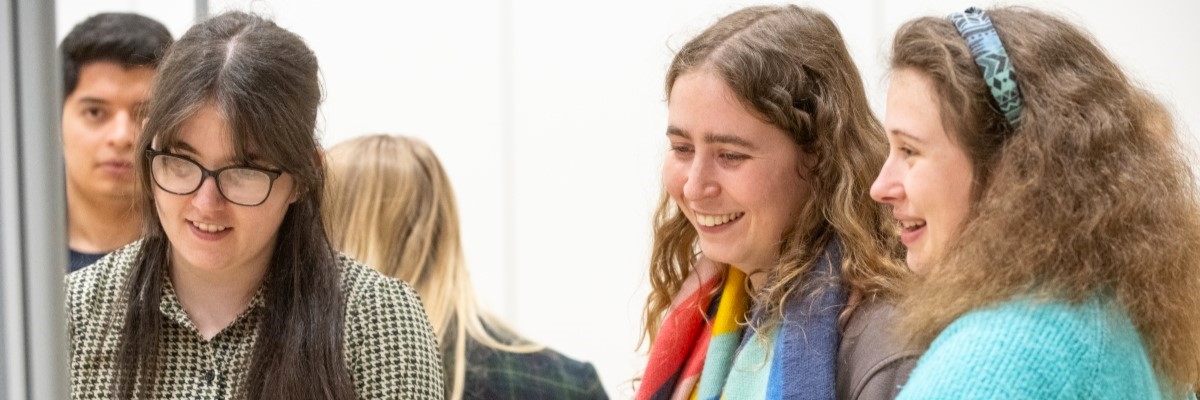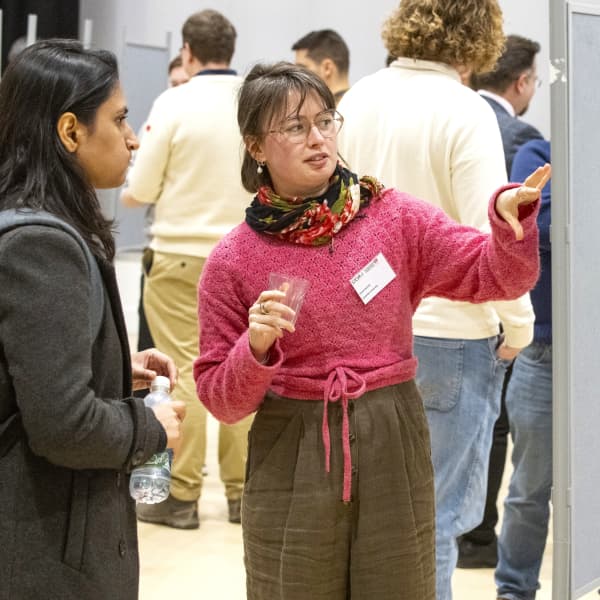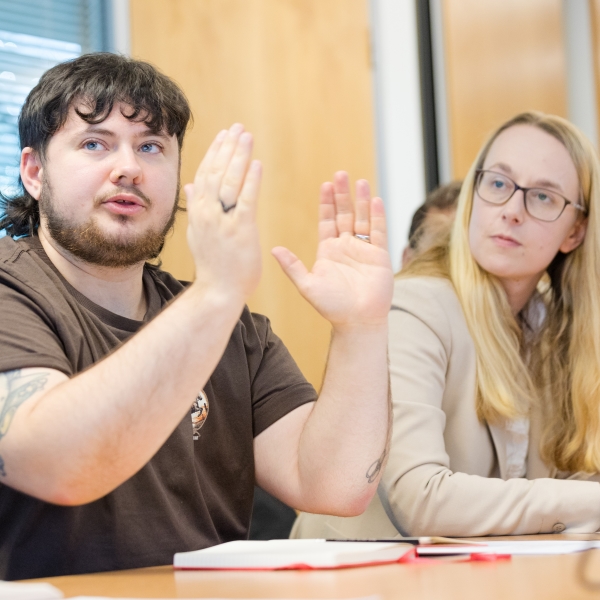Previous STOR-i Conferences
You can find a list of the previous annual conferences below and links to further details for each:
STOR-i's research events, from hands-on problem-solving days to dynamic conferences, will help you develop your skills and knowledge, share your work, and engage with experts in the fields of Statistics and Operational Research.


STOR-i is committed to developing and disseminating research of direct relevance to industry, government, and the academic community, and as such, we hold an annual conference to showcase the centre's research progress and achievement, and allow guests to share ideas and discuss research opportunities within targeted areas.
The conference often has talks from relevant international guest speakers, as well as STOR-i students, Impact Fellows, and alumni, and is open to our industrial partners, visiting PhD students, and to our external advisers.
The recent STOR-i Annual Conference was held on Thursday 08 and Friday 09 January 2026.
The STOR-i Centre for Doctoral Training at Lancaster University hosted their twelfth annual conference, with talks from key researchers from Statistics, Operational Research and Industry.
The event took place in January 2026, in the LICA Building on Lancaster University's campus. Details below.
Conference Talks:
09:30 - Registration and refreshments in LICA foyer
10:00 - Jeremy Bradley, Consulting Data Scientist: Experiences with dynamic pricing and reinforcement learning
10:45 - Jess Spearing, Shell: A Bayesian Block Maxima Over Threshold Approach applied to Corrosion Assessment in Heat Exchanger Tubes
11:15 - Jefferson Huang, Naval Postgraduate School: Risk-Aware Markov Decision Processes
12:00 - Lunch
13:00 - Grazia Speranza, University of Brescia: Optimization in transportation and logistics: trends and research ideas
13:45 - Kajal Dodhia, STOR-i PhD student: Statistical Modelling of Extreme Sea Surface Temperatures
14:00 - Luke Fairley, STOR-i Impact Fellow: Towards the Integration of Strategic and Operational Decision Making
14:15 - Refreshment break
14:45 - James Gleeson, University of Limerick: Data-driven modelling of cascades on networks
15:30 - Jordan Richards, University of Edinburgh: Deep extremal regression: Grey box models for univariate and multivariate extremes
16:00 - Theodore Kypraios, University of Nottingham: Uncovering Dependency Structures in Multivariate Markov Chain Models
16:45 - Close
Evening Poster Session:
17:15 - 20:00 - Poster Session and refreshments in LICA Building
Conference Talks:
09:00 - Registration and refreshments in LICA foyer
09:30 - Amy Wilson, University of Edinburgh: Statistics and the law: improving probabilistic reasoning in criminal cases
10:15 - Graham Burgess, STOR-i PhD student: Multi-fidelity simulation optimisation using Gaussian Markov random fields
10:30 - Wanchen Yue, STOR-i PhD student: Statistical Modelling of Human-Induced Seismicity: Magnitude Uncertainty and Spatio-Temporal Structure
10:45- Refreshment break
11:15 - Rui-Yang Zhang, STOR-i PhD student: Sequential Drifter Placement for Ocean Currents with BALLAST
11:30 - Marc Goerigk, University of Passau: Interpretability and Explainability for Optimization
12:15 - Lunch
13:30 - Close
You can find a list of the previous annual conferences below and links to further details for each:
External:
STOR-i Alumni:
STOR-i Impact Fellows:
PhD Students:
External:
STOR-i Alumni:
PhD Students:
External:
STOR-i Alumni:
PhD Students:
External:
STOR-i Alumni:
PhD Students:
External:
STOR-i Associates:
PhD Students:
External:
STOR-i Alumni:
PhD Students:
External:
STOR-i Associates:
PhD Students:
External:
PhD Students:
External:
PhD Students:
External:
PhD Students:
External:
STOR-i Associates:

The STOR-i Spring School is a new addition to STOR-i's calendar of research and training events, designed to bring PhD students in Statistics and Operational Research together for a focused week of learning, collaboration, and networking.
The week combines several core elements of the STOR-i programme into one cohesive event, including ones such as a masterclass, alumni and industry talks, and a real-world data challenge in partnership with one of our partners. By creating space for students to step away from their day-to-day research and fully engage with new ideas, the Spring School offers a valuable opportunity to build skills, strengthen connections, and explore how research can be applied in practice.
The next STOR-i Spring School will be held from Monday 23 to Friday 27 March 2026.
STOR-i is hosting a week-long Spring School, open to STOR-i PhD students and STOR-i Associates. This free event features a 2-day Masterclass on Modelling in Stochastic Programming, talks from experts in Statistics and Operational Research, and a 2.5 day real-world data challenge alongside Save the Children, one of our charity partners.
Masterclass
Workshop
Data Dive
Career Talks
Federico Andreis, Care Quality Commission
Emily Graham, Roche
Adam Sykulski, Imperial College London
Downloads:
STOR-i Spring School 2026 - Titles and Abstracts
STOR-i Spring School 2026 - Schedule
Biographies (to follow)
Masterclass
Data Dive
Guest Speaker Talks

STOR-i host a mixture of two different types of research workshops: Specialist workshops in methodological developments in Statistics and Operational Research and their interface; and themed specialist knowledge exchange workshops on hot topics.
Both types have a range of invited academic and industrial participants. These workshops contribute to the vibrancy of the research environment at Lancaster in Statistics and Operational Research. They provide an excellent opportunity to keep up-to-date with current internationally-leading research and to instigate collaborations with external academics and new industrial partners.
The workshops are targeted at:
Below are examples of previous research workshops that have taken place in STOR-i.
Choice-based Optimisation and Demand Modelling
The aim of this workshop was to unite researchers who integrate agents' (customers, passengers, drivers, etc.) choice behaviours into an optimisation framework. This two-day event featured keynote presentations, seminar sessions, and interactive discussions, providing a platform for knowledge exchange and collaboration. Participants had the opportunity to engage with cutting-edge research and network with experts in the field.
Burak Boyaci, Dong Li, Alp Arslan, Thu Dang, Yu Jiang
Business analytics typically involves tasks of prediction and optimisation. They are usually conducted separately and are not well connected.
The aim of the workshop was to provide platform for exchange of ideas, raise awareness of recent developments and stimulate discussion in the intersection of the areas of prediction and optimisation.
There was a particular focus on topics including:
Methodological:
Applications:
The past decades have seen much methodological development in the time series and spatial statistics communities. This is driven both by the increasing volumes and complexity of spatiotemporal data being collected, and the growing number of application domains which benefit from such methods. Despite both time series and spatial statistics being based on ordered sets of observations and hence using analogous analysis techniques, there is often a lack of interaction and dialogue between the two communities.
The main aim of the workshop was to focus on exploring synergies and overlaps between methodological approaches in time series, statistical signal processing, spatial statistics, and spatiotemporal statistics.
There was a particular focus on topics including:
Adam Sykulski, Alex Gibberd, Rebecca Killick, Ben Taylor
The need for modern statistical signal processing techniques arises due to the ubiquity of vastly-observed signals across numerous applications. Such techniques commonly encompass aspects of time series analysis, machine learning, stochastic processes, optimisation, and many others. Furthermore, signals are commonly observed jointly, motivating the need for methodology that extends to multivariate and high-dimensional settings.
The main aim of the workshop was to focus on challenges arising in non-parametric methods for non-stationary and high-dimensional signals, bringing together researchers from a number of distinct but related areas of signal processing to share ideas and foster dialogue.
Adam Sykulski, Matt Nunes, Rebecca Killick, Ed Cohen
The multi-armed bandit problem has become classic because of its extreme difficulty. Researchers from different fields, especially statistics, operational research, applied probability and computer science, have made theoretical contributions that in the recent years started gaining wider popularity in practice due to the huge modelling power of this problem.
This workshop provided a forum for stimulating discussions, especially across the approaches that have developed independently of each other. The list of invited speakers includes recognised experts on reinforcement learning bandits, restless bandits, non-parametric bandits, Bayesian bandits, etc., covering both theoretical advances and applications in information technology, business & management, communications networks, health care, etc.
The topics of the workshop included, but were not limited to, the following:
We are grateful to the London Mathematical Society for its additional support for this workshop, in particular for significantly enhanced support for UK PhD students.
David Leslie, Steffen Grunewalder, Peter Jacko
Multivariate time series arise in many natural and industrial applications. These series are often high-dimensional in nature and exhibit complex temporal characteristics. Being able to analyse the structure and interplay between such series is key to understanding the dynamics of many important physical processes. Moreover, the availability of high frequency sources has underlined the need for efficient algorithms for analysis of time series in high-dimensional settings.
The main aim of the workshop was to bring together researchers from a number of distinct but related areas of time series analysis to share ideas and foster dialogue to tackle modern challenges in nonstationary multivariate time series analysis.
Matthew Nunes, Rebecca Killick, Idris Eckley, Lawrence Bardwell, Jamie-Leigh Chapman, Matt Ludkin
Research into extreme value theory is well-established at Lancaster. At the time of the workshop, the extremes group consisted of three members of staff (Professor Jonathan Tawn, Dr Emma Eastoe and Dr Jenny Wadsworth), five STOR-i PhD students and one RA. In addition, STOR-i had, and continues to have, strong links with a number of partners, both academic and industry.
Emma Eastoe, Jenny Wadsworth
There is a wide array of problems in applied science, business analytics and industry that involve a decision-making process that takes into account network structure. The goal of the event was to encourage the exchange of ideas and seed collaboration among researchers developing methodology in the intersection of decision theory and networks Science, bringing together statistics and management science.
Simón Lunagómez, Marc Goerigk

STOR-i hosts multiple research seminars and talks throughout the year. Attending research seminars is a fundamental part of life as an academic researcher, as they provide:
Examples of research seminars available to STOR-i students are:
Seminars in this series are chosen because they are of specific interest to students on the STOR-i programme. If you are a STOR-i student you are strongly encouraged to attend seminars in this series.
For details of both past and upcoming STOR-i seminars see the Events Archive and Events pages.
These are a series of informal weekly talks from STOR-i and STOR-i associated PhD students. These sessions are intended to inform other students and staff about current research projects at STOR-i.
There are more events from associated departments and research centres that may be of interest to STOR-i students.
Below you can find links to various seminar series: